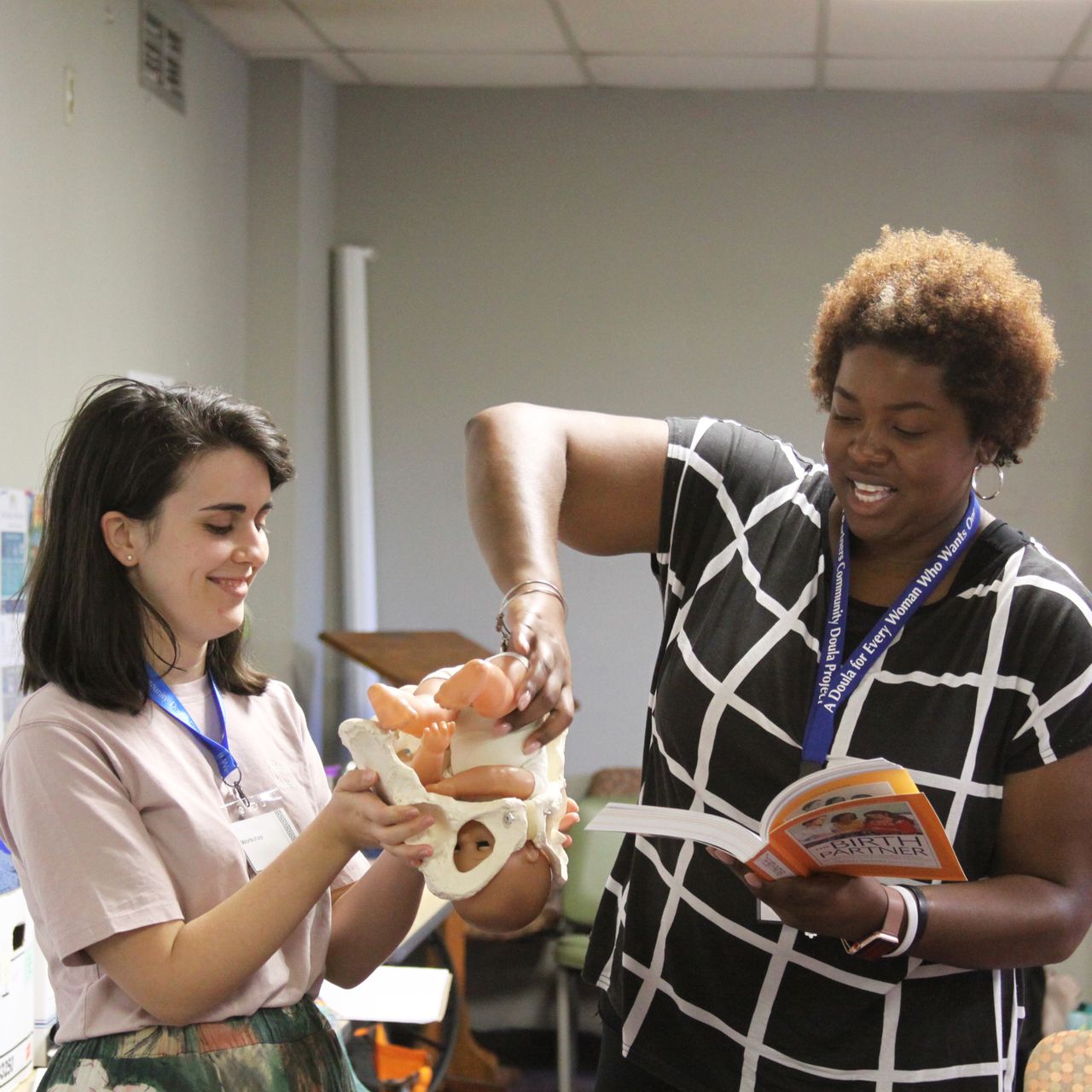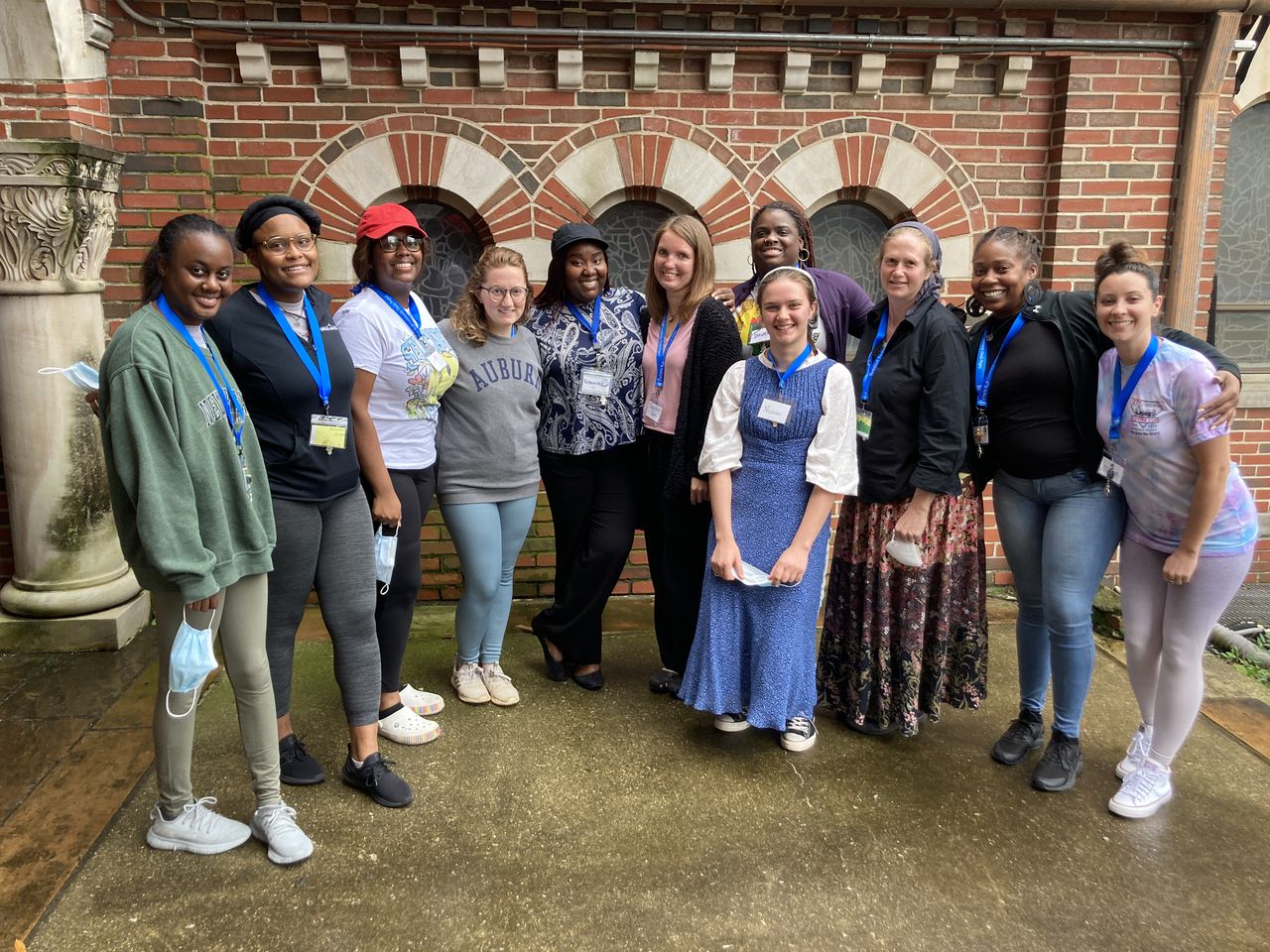Birmingham doula group to help more mothers tackle pregnancy, parenting
During her first two pregnancies, Kendra Burrell said she immediately felt nauseous every time she walked into a hospital.
She found it difficult to ask all the questions that were swirling through her mind during her pregnancies and said she didn’t know how to advocate for herself to her medical staff.
It wasn’t until after attending a birth training that she realized she could alleviate some of her anxiety with information. Now a mother of four and the coordinator of doula care for BirthWell Partners, she calls herself the “doula that doulas doulas.”
Read more: Alabama parents miss work for child care reasons at highest rate in U.S.
Read more: Unlike in other states, Alabama public employees don’t get paid parental leave.
“Most of my fears stemmed from all of the crazy questions I had in my mind that would just replay,” Burrell said. “For me my role as a doula was to kind of help to quiet those random thoughts, those random questions, soothe those anxieties and really forge a connection with the client.”
BirthWell Partners, the Alabama-based community doula organization, received $121,806 in grant funding from Birmingham’s Building Opportunities for Lasting Development program, or BOLD.
Co-founder Dalia Abrams said the money will be used to train more than 30 additional doulas, as well as training on treating people who are HIV positive, those who struggle with substance abuse and parents who want advocacy education.
Firsthand stories from women and recent research show dangerous disparities across the maternal health spectrum, typically affecting Black people, people with lower incomes and people who struggle with substance abuse. Advocates say having more trained doulas available during different stages of pregnancy and postpartum care will not only help parents and children but also may help close the gaps in care many pregnant people experience.
What does a doula do? Why do they make a difference in maternal health?
Doulas are not the same as midwives. Midwives are medical professionals, while doulas function more as a support person, said Abrams, who is also the program director for BirthWell Partners.
“The quick and easy answer is: They provide physical and emotional support, and then they provide advocacy and information – so helping people find the information that they need in order to make decisions for themselves. They help people advocate for themselves, help people to be seen in the medical system.”
Doulas undergo training and certifications before they assist in births. They work with clients before, during and after birth. BirthWell’s Birmingham group, BirthWise, offers birth and postpartum doulas, along with breastfeeding services and parenting classes.
Researchers have said that pregnant people who received doula support had lower rates of cesarean sections and preterm births. Pregnant patients who worked with doulas were also less likely to experience postpartum depression and anxiety.
A group of doulas from across the state of Alabama participate in training from Birmingham-based BirthWell Partners in the fall of 2022. Courtesy of BirthWell Partners.Susan Petrus
Why is postpartum doula care important?
In addition to coordinating doula care, Burrell works with doulas and clients to establish postpartum care.
She said many people call the postpartum period “the fourth trimester.”
“Even when you have support, it is hard, right? You don’t get any sleep, you forget to feed yourself, you forget to take care of yourself because you put everything into this little person,” she said.
Doulas also provide emotional support postpartum. Burrell said help can be as simple as holding the baby while a new parent showers, or assisting a new mom who doesn’t recognize herself after giving birth.
Recent studies show that 13% to 19% of new mothers struggle with postpartum depression, though mothers who are people of color are more likely to experience clinical depression.
“Studies show people of color are more likely to experience symptoms of postpartum depression and anxiety, and less likely to get treatment than their white counterparts,” Anna Claire Vollers of Reckon wrote in February in an article about how doulas can help people of color in the postpartum period.
Burrell said doulas can serve as a support system for the entire family, not just their client.
“Postpartum doulas just offer to carry the load a little longer until Mama is able to do it for herself,” Burrell said.
Nearly 60% of the Alabama women who died within a year of giving birth died 43 or more days after giving birth, according to the state’s most recent maternal mortality report, which detailed deaths from 2016-2017. The report stated that 95.6% had “some” or a “good” chance of a different outcome.
Only one of Alabama’s maternal mortality reports has broken down causes of death specifically. According to that report, which looked at deaths from 2016, 42% of those who died struggled with their mental health and 47% struggled with substance use disorders.
How are doulas beneficial for pregnant people that struggle with substance use disorders?
BirthWell Partners will use BOLD grant money to provide instruction on assisting pregnant clients that struggle with substance use. BirthWell Partners also received a grant from the Alabama Department of Mental Health to train 10 “peer doulas,” who have experience with substance abuse and are specifically trained to work with patients experiencing similar struggles.
Shanika Webb, a contract peer doula working with BirthWell Partners, said pregnant people who struggle with addiction face “huge stigma.” “I definitely think that people can be more compassionate, especially when it comes to a pregnant person that is struggling because it’s not like, you know, you get pregnant and have addiction, and there’s this magical formula,” Webb said. “Addiction…the disease does not discriminate, and so just because you get pregnant, that’s still there.”
Webb was a client at Olivia’s House, a residential program in Birmingham that assists women struggling with addiction and their children, in 2018 and 2019. She said she watched so many women share that they were trying to ” heal and make plans for their baby,” but once they returned with their babies, the Department of Human Resources would come take them from the mothers. She said the mothers were crushed.
“These women can be looked at with more compassion instead of criminalizing them,” she said.
Webb, who also is a certified recovery support specialist for the state of Alabama, said she has been taught how to advocate for her clients, but she also makes it a point to help them learn to advocate for themselves.
She said moms she works with may feel that they shouldn’t be “bothersome” to their doctors or nurses because of what’s on their chart.
“You still deserve the best treatment, as any other mom, as any other housewife, lawyer, whatever,” she said. “You’re still human.”
Webb said many of her clients don’t have a support system. She also strives to help women who struggle with substance use have a “more natural birth with that emotional support.”
Like other doulas, Webb visits with her clients during the postpartum period and helps alleviate stressors. Additionally, she works with them on establishing support systems and making connections with recovery support groups.

Doulas Beth LeBlanc (left) and Ashleigh Aldridge (right) participate in BirthWell’s training program in 2019. Courtesy of BirthWell Partners.Susan Petrus
What is “client advocacy” and why is it important in doula work?
Doulas also help clients advocate for themselves to medical providers during pregnancy.
A 2019 study reported that, out of 2,138 participants, one in six pregnant patients said they experienced one or more types of mistreatment during their pregnancy, such as verbal abuse, being ignored or refused help and a loss of autonomy.
Additionally, patients who were not white were more likely to experience mistreatment during pregnancy.
In 2020, maternal mortality occurred at a rate of 55.3 deaths per 100,000 live births for Black mothers, compared to 19.1 for white mothers. The disparities are even clearer based on age group:
- For Black mothers under age 25, the rate was 28.8 deaths per 100,000 live births.
- For Black mothers 40 and older, the rate jumped to 263.1.
- For white mothers under age 25, there were 11.5 deaths per 100,000 live births.
- For white mothers 40 and older, the death rate was 96.8.
Researchers and activists, including those at the National Health Law Program, have pointed out the role that doulas can play in addressing racial disparities in pregnancy care.
“Doulas who understand the physical, social, and emotional impacts of racism can provide much-needed support to their clients, and above all act as their advocates as their clients navigate medical systems of care,” the report stated.
Burrell, who is a Black woman, said she worried about asking too many questions of her doctors, even though her mind was filled with hypotheticals. She said many of the issues she faced in her first two pregnancies stemmed from a fear of being overly demanding.
“When you walk into a hospital setting, when you’re black and you’re pregnant, there’s so many concerns that you have that probably don’t even begin with just the pregnancy,” she said.
Burrell acknowledged that everyone’s story is different, and said her goal as a doula is to create a safe place for mothers to ask the questions they need to ask, along with “being the doula that is needed for that mama.”
“I think a lot of doctors may not understand that as well that we have to really look at the whole person and try to figure out ‘How can I meet this mama where she’s where she’s at, spiritually, emotionally, physically, in all of these things?’” she said. “A pregnant person is not going to open up to you and just lay everything out if they don’t feel safe.”
BirthWell Partners provide advocacy training for doulas, but they also provide classes that clients can take on their own. Using the BOLD grant money, Abrams said they plan to add ACTT Advocacy Toolkit training, which is designed by the Black Coalition for Safe Motherhood.
Additionally, most of BirthWell Partners’ clients are enrolled in Medicaid, Abrams said.
Abrams said she believes doulas are a step in pursuing better maternal care.
“It’s about saving the life of the baby and saving the life of the mom. This is part of that, and we need to look at it that way, so you know, we call our grant proposal ‘Leveraging the power of doulas to address the infant maternal mortality rate,’” Abrams said. “This isn’t the solution by any means – the whole system needs to be changed; how we do maternity care needs to be changed. But with the system that we have right now, this is part of the solution.”
The organization is also working on training more doulas who represent different communities in Birmingham.
“We are committed to creating sustainable workforce development solutions. By providing training for residents to become doulas and improving maternal and infant health for vulnerable families, BirthWell is improving quality of life for Birmingham residents,” said Coreata Houser, the deputy director of innovation and economic opportunity for the City of Birmingham.
Webb said that doulas bridge the gap between medical care from doctors and nurses and emotional care.
“I think our role is bigger than a lot of people can ever imagine. I love what I do,” Webb said. “When I see a mom light up, and she has somebody there that’s supporting her nonjudgmentally, that makes all the difference in the world.”
